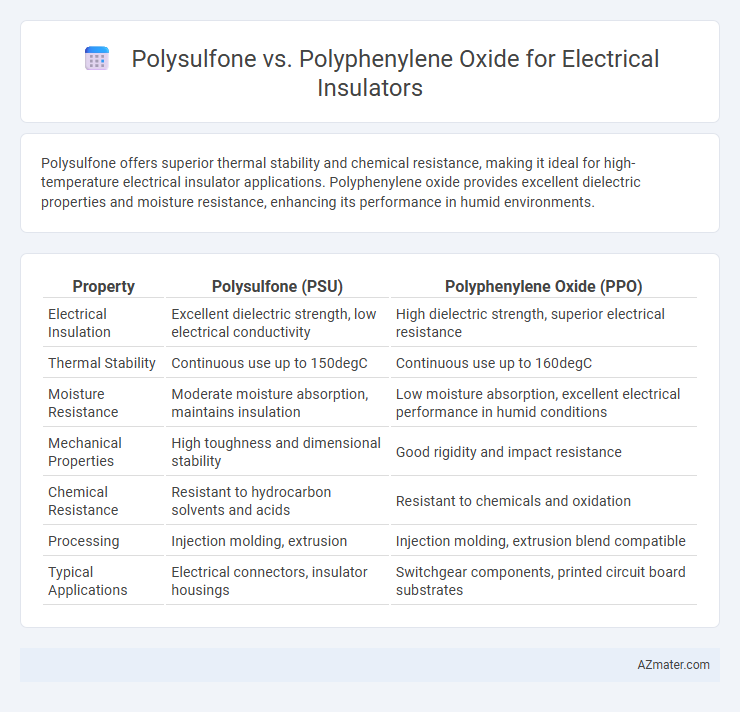Polysulfone offers superior thermal stability and chemical resistance, making it ideal for high-temperature electrical insulator applications. Polyphenylene oxide provides excellent dielectric properties and moisture resistance, enhancing its performance in humid environments.
Table of Comparison
| Property | Polysulfone (PSU) | Polyphenylene Oxide (PPO) |
|---|---|---|
| Electrical Insulation | Excellent dielectric strength, low electrical conductivity | High dielectric strength, superior electrical resistance |
| Thermal Stability | Continuous use up to 150degC | Continuous use up to 160degC |
| Moisture Resistance | Moderate moisture absorption, maintains insulation | Low moisture absorption, excellent electrical performance in humid conditions |
| Mechanical Properties | High toughness and dimensional stability | Good rigidity and impact resistance |
| Chemical Resistance | Resistant to hydrocarbon solvents and acids | Resistant to chemicals and oxidation |
| Processing | Injection molding, extrusion | Injection molding, extrusion blend compatible |
| Typical Applications | Electrical connectors, insulator housings | Switchgear components, printed circuit board substrates |
Introduction to Electrical Insulators
Electrical insulators prevent the flow of electric current by creating a high-resistance barrier between conductive materials. Polysulfone offers excellent thermal stability and mechanical strength, making it suitable for high-temperature electrical insulation applications. Polyphenylene oxide provides superior dielectric properties and moisture resistance, contributing to reliable electrical insulation in humid environments.
Overview of Polysulfone (PSU)
Polysulfone (PSU) is a high-performance thermoplastic known for its excellent thermal stability, mechanical strength, and inherent flame resistance, making it ideal for electrical insulation applications. Its glass transition temperature typically ranges around 185degC, providing reliable performance under elevated temperatures compared to many other polymers. PSU's chemical resistance and dimensional stability under humid conditions further enhance its suitability as an electrical insulator in demanding environments.
Overview of Polyphenylene Oxide (PPO)
Polyphenylene Oxide (PPO) is a high-performance thermoplastic known for its excellent electrical insulating properties, dimensional stability, and resistance to moisture and heat. It exhibits low dielectric constant and loss, making it ideal for high-frequency electrical applications. Compared to Polysulfone, PPO offers superior electrical insulation and thermal stability, contributing to its widespread use in advanced electrical components.
Dielectric Strength Comparison
Polysulfone exhibits a dielectric strength ranging between 18-20 kV/mm, making it a robust choice for high-performance electrical insulators requiring thermal stability and mechanical strength. In comparison, Polyphenylene Oxide offers a slightly higher dielectric strength, typically around 20-25 kV/mm, which contributes to superior electrical insulation properties in demanding environments. The enhanced dielectric strength of Polyphenylene Oxide makes it preferable for applications needing greater resistance to electrical breakdown and prolonged electrical reliability.
Thermal Stability and Heat Resistance
Polysulfone exhibits excellent thermal stability with a continuous use temperature up to 150degC, making it suitable for electrical insulators exposed to moderate heat. Polyphenylene oxide offers superior heat resistance, maintaining structural integrity at temperatures exceeding 180degC, making it ideal for high-temperature electrical applications. Both polymers provide excellent electrical insulation properties, but PPO's higher glass transition temperature enhances performance in extreme thermal environments.
Mechanical Properties and Durability
Polysulfone exhibits superior impact resistance and tensile strength compared to polyphenylene oxide, making it highly suitable for demanding electrical insulator applications requiring mechanical robustness. Polyphenylene oxide offers excellent dimensional stability and thermal resistance, enhancing long-term durability under fluctuating temperatures and electrical loads. Both materials demonstrate high dielectric strength, but polysulfone's enhanced toughness provides better resistance to mechanical deformation and aging in harsh environments.
Chemical Resistance and Environmental Stability
Polysulfone exhibits superior chemical resistance against acids, bases, and hydrocarbons, making it ideal for electrical insulators exposed to harsh chemicals. Polyphenylene oxide offers excellent environmental stability with high thermal resistance and dimensional stability, enhancing performance in fluctuating temperature conditions. Both materials provide strong dielectric properties, but polysulfone is preferred where chemical exposure is more critical, while polyphenylene oxide excels in high-heat and moisture-prone environments.
Processing and Manufacturing Considerations
Polysulfone offers excellent thermal stability and chemical resistance, making it suitable for high-performance electrical insulators, but its processing requires higher temperatures and specialized equipment due to its higher melting point. Polyphenylene oxide provides easier processing with lower melt viscosity, enabling more efficient injection molding and extrusion, which reduces manufacturing cycle times and costs. Both materials demand precise control of drying and extrusion parameters to prevent degradation and ensure consistent electrical insulating properties.
Cost Efficiency and Material Availability
Polysulfone (PSU) offers cost efficiency and widespread availability, making it a practical choice for electrical insulators with moderate thermal stability and excellent dimensional stability. Polyphenylene Oxide (PPO) provides superior electrical insulation and thermal resistance but at a higher cost and with more limited supply compared to PSU. Evaluating budget constraints and required performance levels ensures the selection of the optimal material for electrical insulation applications.
Application Suitability in Electrical Insulators
Polysulfone (PSU) and Polyphenylene Oxide (PPO) both exhibit excellent electrical insulation properties, but their application suitability depends on specific performance requirements. PSU offers superior thermal stability and mechanical strength, making it ideal for electrical insulators in high-temperature environments such as industrial motors and transformers. PPO provides outstanding dielectric properties and moisture resistance, which is advantageous for insulators used in humid or outdoor electrical equipment.

Infographic: Polysulfone vs Polyphenylene Oxide for Electrical Insulator
 azmater.com
azmater.com